The Special Press Conference on Tacheng Prefecture by Xinjiang Uygur Autonomous Region
Dec. 2nd, 2021
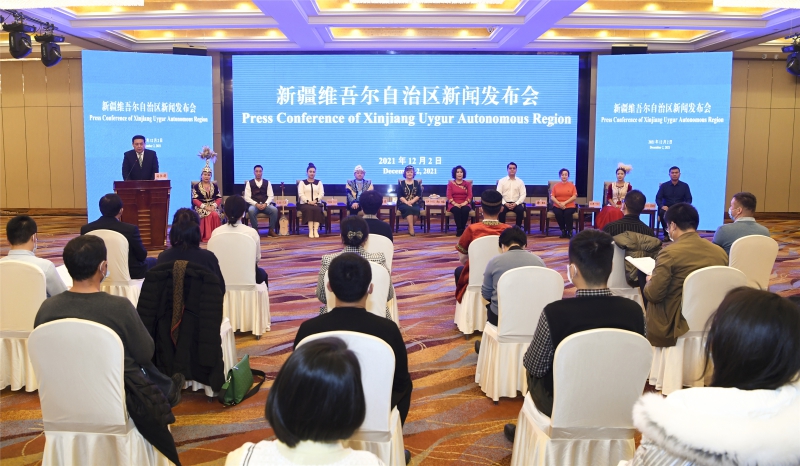
Photo taken on December 2, 2021 shows the special press conference on Tacheng Prefecture by Xinjiang Uygur Autonomous Region in Urumqi, capital of XUAR. Photo by Xinjiang Daily/ Tang Yong
On December 2nd, 2021, Xinjiang Uygur Autonomous Region held a special press conference on Tacheng Prefecture, and one official, and 10 grassroots cadres representatives from the general public were presented. Let’s listen to their stories about the development and changes of Tacheng Prefecture and feel the happy life of the masses of all ethnic groups.
Host: Good morning, dear fellow media reporters! Welcome to the special press conference of Xinjiang Uygur Autonomous Region on Tacheng Prefecture. I'm Hailatti, the host of this press conference.
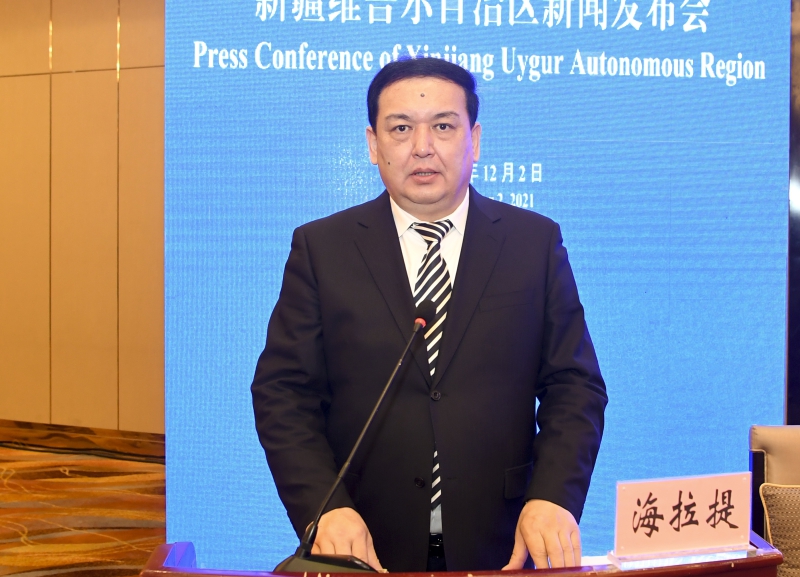
Photo taken on December 2, 2021 shows Hailatti, the host of the special press conference on Tacheng Prefecture by Xinjiang Uygur Autonomous Region. Photo by Xinjiang Daily/ Tang Yong
Nowadays, the overall social situation in Xinjiang remains stable, the people live and work in peace and contentment, and unprecedented achievements have been made in economic development and the improvement of people's livelihood. Also, great achievements have been accomplished in various undertakings, and the people of all ethnic groups have a growing sense of gain, happiness and security. Xinjiang has been home to numerous ethnic groups and various cultures since the ancient time. The long-term exchange and interactions of the cultures of all ethnic groups, which flourish and develop vigorously in Chinese civilization, is an integral part of Chinese cultures. With a long history of commerce, Tacheng is an important area on the ancient and modern Silk Road, an important channel for the exchange of civilizations between the East and the West and a gathering place of cultures of all ethnic groups. Today, Tacheng enjoys a harmonious and stable society, with its distinct geographical advantages, pleasant ecological environment, rapid development momentum, and rapid and steady development of various industries.
Today, we are pleased to have Aydin Toluhan, the Commissioner of Tacheng Prefecture Administration, with us to introduce the situation of high-quality economic development, rural revitalization and employment benefiting the people in Tacheng Prefecture.
At the same time, we’ve also invited 10 citizens to talk about their happy life. They are: Zatunna Kalimua, a resident of Tacheng City, Wurken, an employee of the Tacheng Branch of the Postal Savings Bank of China; Demulati Nigati, a village cadre of Qiaonan Village; Emin Town, Emin County; Nurlan Uruzhali, a villager of Laozhuangzi Village, Huanggong Town, Wusu city; Giaina Gerken, a herdsman of Ken A'Gen Village, Boltonggu Township, Shawan City; Hazza Tohay, a cadre of the Children's Club in Tuoli County; Ayguli Mayer, a teacher of the No.1 Kindergarten in Yumin County; Dorji Nima, the Deputy Director of Jiang'ger Art Troupe of Hoboksar Mongolian Autonomous County.
Host: Next, let’s give the floor to Aydin Toluhan, the Commissioner of Tacheng Prefecture Administration, to introduce the economic and social development and improvement of people's livelihood in Tacheng.
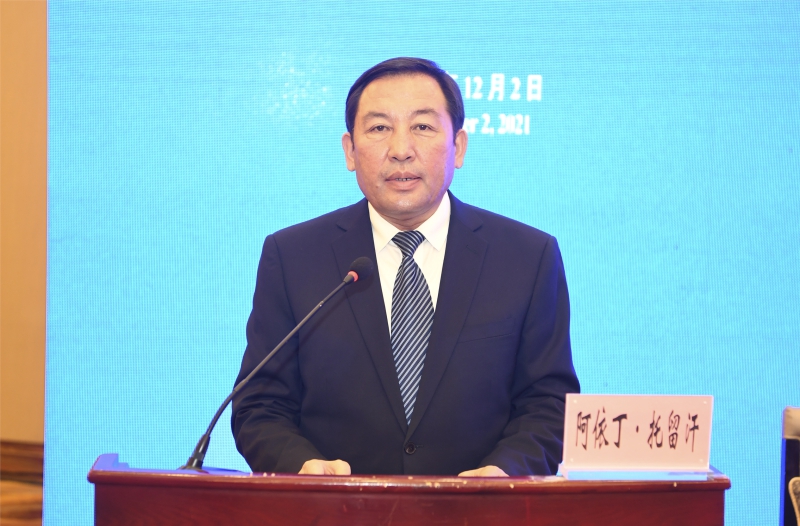
Photo taken on December 2, 2021 shows Aydin Toluhan speaks at the special press conference on Tacheng Prefecture by Xinjiang Uygur Autonomous Region. Photo by Xinjiang Daily/ Tang Yong
Aydin Toluhan: Good morning, ladies, gentlemen and dear friends from the media! Hereby, I want to thank you for your long-term attention and support to Tacheng! Welcome to today's press conference!
Tacheng Prefecture is located in the northwest of our motherland, with a total area of 105,000 square kilometers and a total regional population of 1,138,600, of which ethnic minorities account for 47.9%. Located in the economic belt on the north slope of Tianshan Mountain, Tacheng has enjoyed the reputation of "Oil Painting Tacheng, Cultural Sanctum and Paradise for Living". With a long history of commerce, Tacheng is an important stop on the ancient Silk Road, known as "Portal Junggar" and "Trade Corridor of Central Asia". There are five counties or cities along its border, with a border line of 540.6 km. There’s a national first-class port -- Baktu Port which is the nearest inland treaty port to the city in Xinjiang, with superior trade conditions.
Since the Eighteenth National Congress of the CPC, we have earnestly implemented the CPC's strategy for governance in Xinjiang in the new era. The overall social situation has remained stable, the economy has been developing in a steady and sound way, the people of all ethnic groups live and work in peace and contentment, and their sense of gain, happiness and security have been continuously enhanced.
The economy has achieved high-quality development. Based on the new development stage, we apply the new development philosophy, serve and integrate into the new development dynamic, continue to deepen the supply-side structural reform, continuously optimize the industrial structure, and continuously enhance the comprehensive strength of the regional economy. In 2020, the GDP of the region was 73.757 billion yuan, an increase of 23.955 billion yuan compared with 2015, with an average annual growth of 6% in the last five years; and the general public budget revenue was 3.577 billion yuan. In particular, on December 7, 2020, a state-level key Development and Opening Experimental Zone in Tacheng, Xinjiang was approved by the State Council, and on September 2nd , 2021, the people's Government of the autonomous region specially issued “Several Policies on Accelerating the High-quality Construction of Key Development and Opening Experimental Zone in Tacheng, Xinjiang”, which has given strong policy support to the construction of the experimental zone from the aspects of finance and taxation, opening-up, characteristic industries, basic construction and talent development. At present, the first batch of 45 key projects in the experimental zone are in active acceleration to the construction. The economic development of Tacheng Prefecture is promising, and the masses of all ethnic groups are full of confidence in the economic development of Tacheng Prefecture and a happy life in the future.
The people’s living standards have been improved continuously. We have firmly been sticking to the philosophy of people-centered development, with more than 70% of fiscal expenditure being spent on improving people's livelihood, while continuing to promote the projects benefiting people in terms of employment, education, medical treatment and social security, thus, a number of problems relating to people’s livelihood and concerning the vital interests of the mass have been addressed. We’ve prioritized employment and fully implemented various policies to promote employment, with an annual average of 35,000 new positions being created in urban areas. The unemployment rate that the urban registered was limited within 4.5%. At least one family number in each household has been offered a position to support the family. We have adhered to the policy of social security benefiting the people and built a sound web of social security , and the participation rate of various social insurances has reached more than 95%. We give priority to education, providing three-year free education for rural preschool children of school age, and provide full coverage of vocational education and training for unemployed junior and senior high school graduates. We’ve adhered to the policy of medical treatment benefiting the people. Since 2016, we have carried out free health checkups for the whole people every year, fully implemented the "hospitalization before payment" and "one-stop settlement", realized full coverage of serious illness insurance for urban employees, and the standardization rate of township (town) health centers and village clinics has reached 100%. We seized the great opportunity of Liaoning's aid to Xinjiang, strengthened communication, continued to promote medical, education, talents, industry and other aid to Xinjiang, won a total of 3.5 billion yuan of aid to Xinjiang, implemented 331 aid projects to Xinjiang, and benefited more than 600,000 people. In 2020, the disposable income of urban residents was 30,570 yuan and the per capita disposable income of rural residents was 18,290 yuan, with an average annual increase of 1094.6 yuan and 941.4 yuan respectively during the five years. The sense of gain, happiness and security of the masses of all ethnic groups has been significantly enhanced.
All ethnic groups are united and tied as a family. We give full play to the good atmosphere of "living in the same city, having the same meal, dancing the same dance, singing the same song, building the same home and loving the same country" among all ethnic groups. Activities of "promoting national unity" and strengthening national unity were held. Exchanges among all ethnic groups were carried out. Among 330,000 families in the prefecture, there are more than 11,000 families composed of more than two different ethnic groups, and among them, multi-ethnic families in some communities in Tacheng City and Wusu City account for about 20%. We have deeply explored and made good use of the elements and highlights of the fine traditional cultures of various ethnic groups, created stage dramas and songs such as Love for Hometown, Love in Tacheng, Garrison Suite. Shalekjam Yiming, an advanced individual of national unity who raised the national flag at home all the time, emerged, and Tacheng Prefecture has been named the "State-level Demonstration Area of National Unity and Progress" for many consecutive years. We have created a "food street" and a "custom park" with nationalcharacteristics, and held activities to celebrate festivals such as the Kazakh Aken Aytes Cultural Festival, the Nadam Fair, the Xibe Westward Migration Festival, the Daur Woqibei Festival and the Hui Hua’er Folk Song Festival, so that people of all ethnic groups can communicate and interact in contacting, talking and singing, gathering and chatting. The concept that “we are all Tacheng people, we are all Xinjiang people and we are all Chinese" is deeply rooted in the hearts of the people.
The sky of Tacheng is blue and the flowers bloom beautifully. There are magnificent and beautiful Tianshan Gallery, classic and natural grassland scenery, vivid and lifelike Great Man Mountain, magic Yardang Landform, diverse cultures with different characteristics and characteristic food with strong flavor. It is a place where "you don't want to leave once you are here, and you still want to come when you leave".
Welcome friends from all over the world and the country to visit Tacheng, so that you feel the development and changes of Tacheng and the happy life of the people of all ethnic groups.
Thank you!
Host: Thanks for commissioner Aydin Toluhan’s introduction.
Xinjiang embraces cultural diversity and inclusiveness, and highlights mutual learning among cultures. The region fully respects and protects folk traditions, thus realizing the harmonious coexistence of different cultures. And the fine traditional culture of all ethnic groups has been effectively protected and inherited. Zatunna Kalimua, the representative inheritor of state-level intangible cultural heritage project -- Saban Festival, has witnessed the protection, inheritance and development of the "Saban Festival" in Tacheng Prefecture.

Photo taken on December 2, 2021 shows Aydin Toluhan speaks at the special press conference on Tacheng Prefecture by Xinjiang Uygur Autonomous Region. Photo by Xinjiang Daily/ Tang Yong
Zatunna Kalimua: My name is Zatunna Kalimua, a Tatar and I’m the representative inheritor of state-level intangible cultural heritage project -- Saban Festival. I was born in a well-educated Tatar family in Tacheng. After my grandparents settled in Tacheng in 1915, my family have always maintained the tradition of celebrating "Saban Festival". Now let me tell you what is “Saban Festival”.
“Saban Festival” is a unique traditional festival for Tatar. “Saban” is a kind of ploughing tool of Tatar. According to folklore, Saban promoted the agricultural productivity of the Tatar, so in order to commemorate the invention of this new plow, the Tatar people gathered together to celebrate after the busy spring farming every year. Over time, this celebration evolved into a traditional festival of the Tatar.
In recent years, as the philosophy of protecting intangible cultural heritage deeply rooted in the hearts of the people, Saban Festival is more and more grand, and the content is richer and richer year by year. On the festival, we would choose a place with beautiful scenery for various entertainment and theatrical performances such as wrestling, racing and horse racing.
In 2008, the Tatar "Saban Festival" project was included in the list of state-level intangible cultural inheritance and protection projects. Tatar’s cultures and art forms are fully displayed in various cultural activities in Tacheng. The traditional festival "Saban Festival" is held as scheduled every year, with increasing influence, and more and more people, with higher and higher enthusiasm, care about Tatar culture and participate in tapping, inheritance and publicity. Now, "Saban Festival" has become a well-known traditional festival, which has attracted more and more people's attention and more and more people are enthusiastic about the protection and inheritance of national cultures.
As an inheritor and protector of Tatar culture, I have been collecting and sorting materials for research, excavation, protection and inheritance. In this process, I have received the support of our country’s special funds and governments at all levels actively provide help. It is such a good policy that helps me better inherit the Tatar culture and make the essence of national cultures of long standing.
The anti-China forces in the US and the West deliberately call white black and slander Xinjiang under the pretext of "genocide" and "cultural extinction", which is ridiculous. Our country gives strong support to the protection of the traditional cultures of ethnic minorities in Xinjiang and provides us with such good conditions to inherit the tradition. Who has seen "genocide" of this kind? Your malicious lies will eventually be exposed by the facts. Our happy life is never to be slandered!
Host: Thanks for Zatunna Kalimua’s statement. Xinjiang attaches great importance to national unity, deeply promotes national unity and progress, strengthens exchanges and blending among all ethnic groups, and promotes the concerted efforts and harmonious development of all ethnic groups. Tacheng Prefecture has been named as the "State-level Demonstration Area of National Unity and Progress" for many consecutive years, and all ethnic groups live in harmony and are close to each other. Next, let’s give floor to Wurken, an employee of the Tacheng Branch of the of the Postal Savings Bank of China, to tell his story.
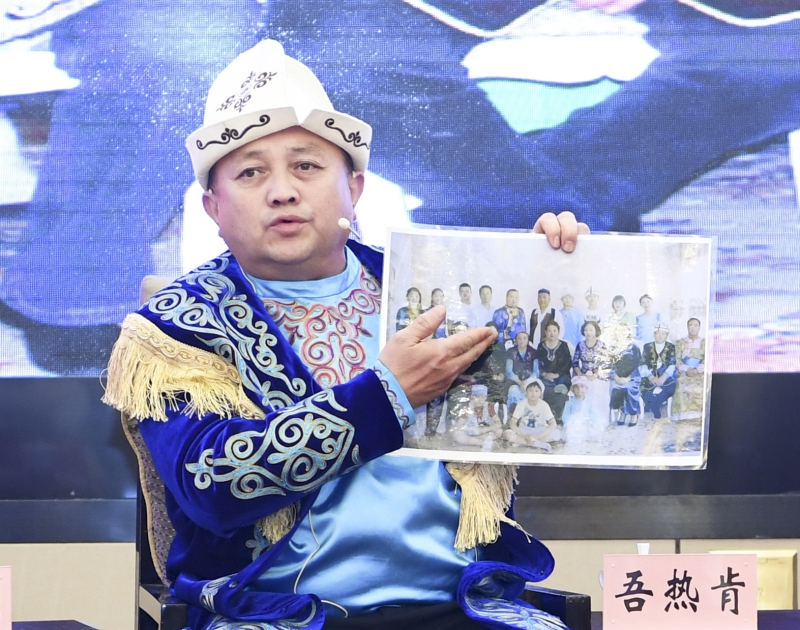
Photo taken on December 2, 2021 shows Wurken speaks at the special press conference on Tacheng Prefecture by Xinjiang Uygur Autonomous Region. Photo by Xinjiang Daily/ Tang Yong
Wurken: Hello, my name is Wurken, a Kirgiz working in Xinhua Road sub branch of Tacheng Branch of the Postal Savings Bank of China. There are 23 people in my family. It is a big family composed of four different nationalities. My wife and brother-in-law are Mongolian; the eldest brother-in-law is Han and the second brother-in-law is Kazakh.
In our big family, every nuclear family is formed through choosing spouse on their own terms. I renovated the old house which was built in the 1980s, and set up a private museum to exhibit more than 20 kinds of old objects. There are limited number of items, but they are very typical and representative, which makes people intuitively understand the changes of our life in decades. Whenever the neighbors come to visit, I would tell them the history of each exhibits, and introduce the life and stories at that time. Compared with the good lives we live now, we should cherish them.
For our family, the annual Spring Festival, Lantern Festival, Nadam Fair, Corban Festival and so on, are all necessary festivals that we would celebrate. For every festival, gathering is a must. When we are gathering together, the dishes are more like a multi-ethnic food exhibition. My wife brought out freshly boiled mutton, my sisters brought tasty smoked horse sausages, my brother-in-law's brought braised fish in brown sauce and other specialty dishes, which were to the taste of every family member.
Although everyone in our family grew up in different background with different living habits, we all choose to respect each other, focusing on each other’s advantages and learning from each other. Take diet as an example, different nationalities have different customs. Now everyone in our family likes to eat the dishes and fish made by my brother-in-law, and his skills of cooking meat and making milk tea and are getting better and better. This is how our family respects and integrates with each other in our daily life.
My family lives in Wudao lane, Haldun street, Tacheng City, which is home to 14 nationalities. When I was a child, my mother has often told me the importance of ethnic unity. Since childhood, children from all ethnic groups would visit my home, and my mother also has many good friends from different ethnic groups. The seeds of ethnic unity are sowed in everyone's heart, flowing in the blood and melting in the bones, and become the family tradition.
There are also a lot of families composed of many nationalities living in harmony, and no one can separate them. In my opinion, no matter where we are, we are all members of the Chinese nation. We should help each other and safeguard national unity with our own actual deeds.
I am very indignant that the anti-China forces in the United States and the West wantonly discredit China and slander Xinjiang on the Internet. They fabricated that Xinjiang "oppresses ethnic minorities". Their purpose is to undermine the unity and stability among all ethnic groups in Xinjiang, their slander and attacks will eventually be in vain. They are in no position to judge our happy, harmonious and stable life. They will eventually become clowns of the world.
Host: Thank you for your sharing. Xinjiang has been home to numerous ethnic groups since ancient time. The people of all ethnic groups living in Xinjiang are in close contact, interdependent, with a shared future and a common stake. They work together for common prosperity and development. Accordion has a profound cultural soil and social foundation in Tacheng, and it has become an indispensable part of people’s life of all ethnic groups. Whenever receiving guests, observing festivals, holding parties or wedding ceremonies, playing accordion has played an important role for people of all ethnic groups in communicating and interacting with each other. Next, let's invite Lu Hong, a teacher of the sixth primary school in Tacheng City, to tell us her story with the accordion.
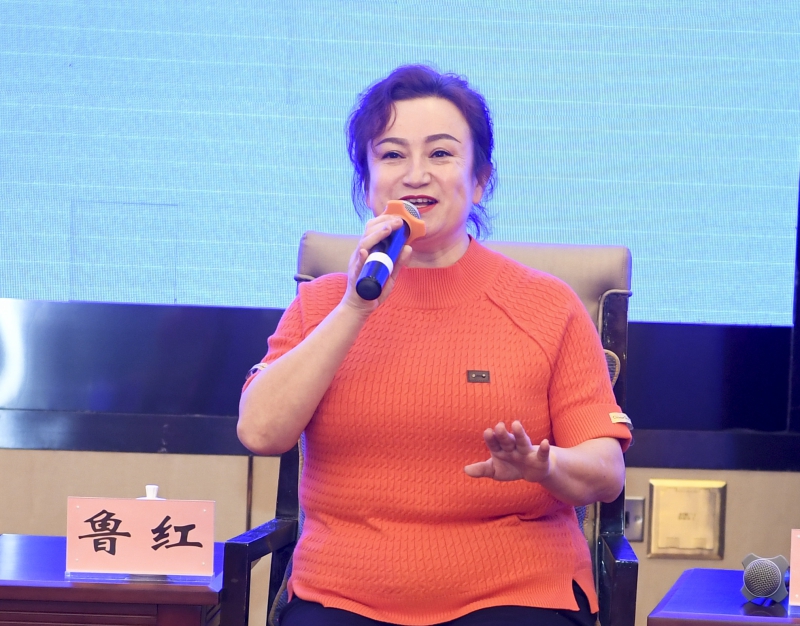
Photo taken on December 2, 2021 shows Lu Hong speaks at the special press conference on Tacheng Prefecture by Xinjiang Uygur Autonomous Region. Photo by Xinjiang Daily/ Tang Yong
Lu Hong: Hello, I am Lu Hong, a music teacher from Tacheng City.
Tacheng City is a small border town with multi-ethnic integration. It has rich and multi-cultural heritage. The customs, diet and other cultures of various ethnic groups blend together. Among many ethnic cultures, the accordion has a deep cultural soil and social foundation here. There is an accordion museum in Tacheng, which gathers accordions from all over the world. The exhibition hall collects more than 1000 accordions of different brands from 10 countries such as China, Russia, Germany, Italy, Ukraine and so on. Different exhibition areas can experience accordion culture of different countries, and many tourists come to visit every year.
In 2016, more than 1,500 accordion players in Tacheng City performed The Beautiful Talbahatai, with performers from all walks of life, with 17 ethnics. The oldest player was 69 years old and the youngest was only 7 years old, which successfully breaks the Guinness world record.
Accordion has now become a household name of Tacheng City and is also known as "the capital of accordion". For us, the accordion is the most familiar and intimate. It is an instrument that accompanies our growth, and we all grew up listening to the melody of the accordion. When friends get together and couples get married, everyone would gather together, singing and dancing with the accompany of the accordion, and enjoying the happiness brought by the accordion.
Now, accordion has entered the school and classroom. In our daily teaching, in order to get children feel the charm of accordion and understand the history of accordion, we move the music class to the accordion museum and the accordion inheritance family in the way of setting up the emotional classroom, so that students can learn the accordion in a relaxing and pleasant atmosphere and inherit the happiness of playing the accordion.
The anti-China forces in the United States and the West turn a deaf ear to the development and progress of the human rights cause in Xinjiang. Having never visited Xinjiang and known nothing about the actual situation of Xinjiang, on the pretext of so-called "violation of human rights", they slander my hometown with "cultural extinction" and "genocide". They defamed Xinjiang without a bottom line but total madness. In essence, under the guise of human rights and the veil of human rights, all that they want is to undermine the overall situation of stability in Xinjiang, which is completely futile and impossible to achieve.
Host: Thanks for Lu Hong’s statement. In accordance with the principle of " protection-oriented, rescue comes first, rational utilization, inheritance and development", Tacheng City has strengthened the protection of intangible traditional cultural heritage of all ethnic groups and issued a series of intangible cultural heritage protection systems, which provides an institutional guarantee for scientific and systematic rescue and protection of intangible cultural heritage. Next, let’s invite the head of the cultural station of Asir Daur Ethnic Township in Tacheng City, Guo Mei, to tell her story.
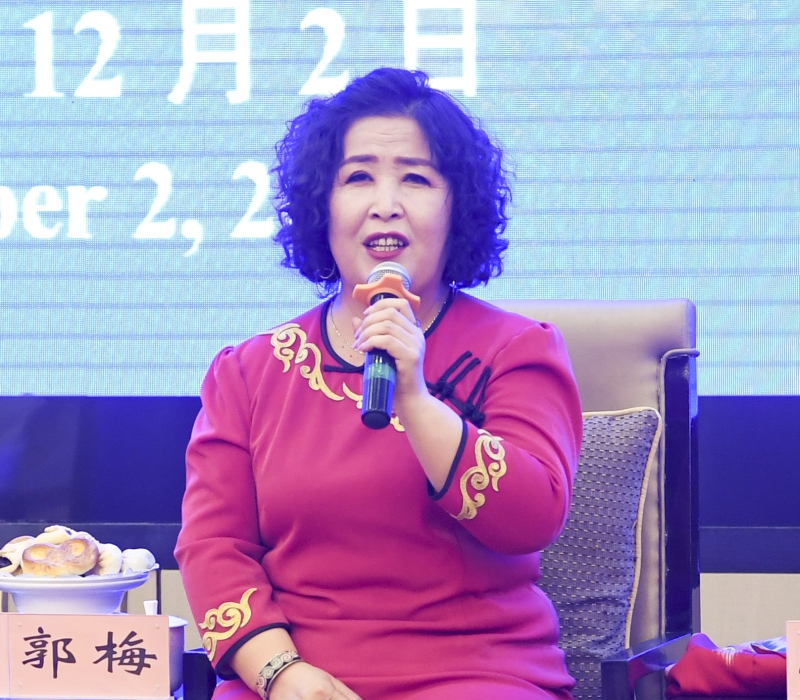
Photo taken on December 2, 2021 shows Guo Mei speaks at the special press conference on Tacheng Prefecture by Xinjiang Uygur Autonomous Region. Photo by Xinjiang Daily/ Tang Yong
Guo Mei: Hello, I am Guo Mei, a Daur, from Asir Daur Ethnic Township in Tacheng City. Our family of three has a daughter who is now in high school.
I have been engaged in grass-roots cultural publicity for more than 20 years. Now I am the head of the township cultural station. Jiazi is my father, he is versatile and has created more than 40 songs in his life, including "hometown of colored clouds", "song of monument", "where I grew up in guar society"and so on. Among them, "hometown of colored clouds" has become the rural song of Asir Daur Ethnic Township. Since I was a child, I learned vocal music, song and dance, Daur culture and customs with my father. Under his influence, I was determined to be a "cultural messenger" like my father.
Asir Daur Ethnic Township is the only Daur Ethnic Township in Xinjiang. In 1998, a Daur folk custom park was built, which became an important place for people to hold festival activities. There is a "Daur border defense monument" spontaneously constructed by Daur people in the park to commemorate the heroic deeds of Daur officers and soldiers who overcame great environmental difficulties to set off from the northeast to defend the border for the country for years at that time. The history of guarding the border for the country over thousands of miles reflects the patriotism of the Daur nationality and all ethnic groups. In April 2013, after rearrangement and transformation, the folk custom exhibition hall covers an area of 400 square meters, with four exhibition halls, displaying more than 180 photos and physical objects. It receives more than 7,000 tourists every year.
In order to better inherit the national culture and introduce the history of Daur to tourists, I consulted a lot of materials and interviewed many Daur elders to understand various Daur handicrafts, songs, dances and so on.
In 2019, I was invited to Beijing to participate in the second national Daur folk song and dance competition. The Daur song "hometown of colored clouds" created by my father deeply moved the expert and judges present and won the first prize, which also strengthened my determination to protect and inherit intangible cultural heritage.
Daur nationality also has an important festival named Woqibei Festival. On June 8th every year, everyone gets up early to tidy up the courtyard, puts on traditional costumes and holds sacrificial activities in front of WoBao. Everyone will pick up the scattered stones and put them on WoBao, insert the wicker in the center of WoBao and tie the colored ribbon on it to express blessings.
Daur nationality also has some special delicacies, such as sauron cake, blood sausage, snow water noodles and so on. The noodles is to use the snow water which melted in spring to cool the cooked noodles, it tastes very delicious. We also make fish shaped dumplings on New Year's Eve, because the Daur nationality used to live in the Nenjiang River Basin. Making fish shaped dumplings reposes the emotion of missing their hometown. The women in Daur nationality are very good at embroidery. After absorbing and learning from the crafts of other nationalities, Daur nationality in Xinjiang have formed a very distinctive embroidery style.
I am very indignant that the anti-China forces in the United States and the West have fabricated that ethnic minorities in Xinjiang are facing "cultural extinction" and "restricted freedom of speech", and ethnic minorities have been "forced", "oppressed" and "discriminated". I can tell you that all nationalities live together and have a very comfortable and happy life, just like a family. Those rumormongers are just jealous of us!
Host: Thanks for the sharing of Guo Mei. Recently, the anti-China forces in the United States and the West fabricated the fallacy of "forced sterilization" in Xinjiang, in a vain attempt to provoke ethnic relations in Xinjiang with lies. But the fact is that the level of maternal health care in Xinjiang has improved significantly. By 2020, the rate of prenatal examination has reached 98.53%, and the rate of hospital delivery has reached 99.82%. Whether people of all ethnic groups take contraceptive measures and what kind of contraceptive methods they take are decided by individuals independently and voluntarily. Next, let’s invite Demulati Nigati, a village cadre of Qiaonan Village, Emin Town, Emin County to talk about his life.
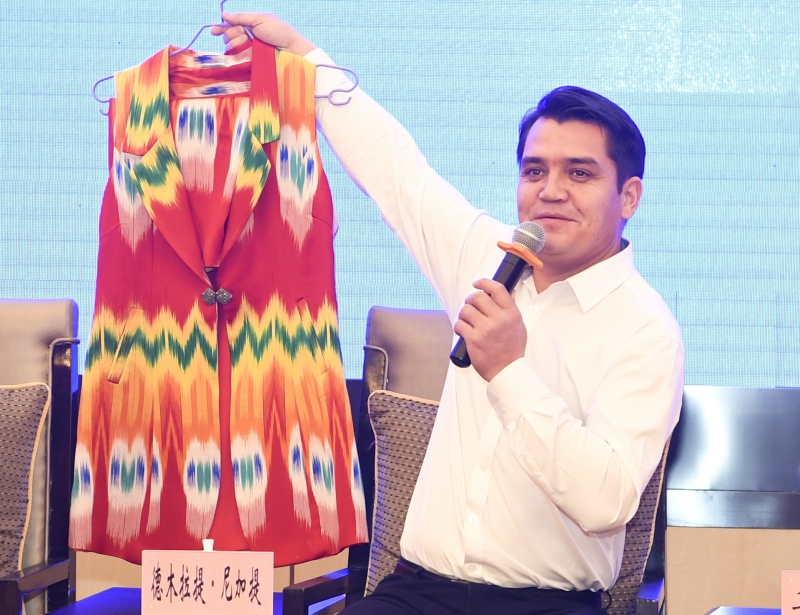
Photo taken on December 2, 2021 shows Demulati Nigati speaks at the special press conference on Tacheng Prefecture by Xinjiang Uygur Autonomous Region. Photo by Xinjiang Daily/ Tang Yong
Demulati Nigati: I am Demulati Nigati, a Kazakh. I am a native of Emin County, and my wife Munawal Aini is Uygur. We have established a fashion design studio in Emin County. We have two daughters, one is eight and the other is seven. Both of them go to No.2 primary school in Emin County. Now, my wife has been pregnant again for six months. Our family is looking forward to the arrival of the newborn.
When my wife graduated from university, she worked as a teacher in Emin County for some time. Later, because of her love for fashion design and production, she resigned and opened a fashion design studio. All the clothes she sells now are designed and made by herself, the original women's clothes with national characteristics have novel styles and good quality. The single piece price is between 300 yuan and 3000 yuan, they are very popular and sell very well. Her monthly income can reach more than 30000 yuan, which is much higher than mine! Customers like her clothes very much, and my wife is also very happy to see them become more beautiful. She also recruited two apprentices to teach them the skills so that they can improve their living conditions and live a good life like us.
We don't need to worry about our two daughters from birth to now. When preparing for pregnancy, the County Maternal and Child Health Hospital would provide us with free folic acid. After birth, the staff of the County Maternal and Child Health Hospital would come to check the health status of the baby and my wife, and the baby also enjoyed the benefit of regular free vaccination. The kids were offered medical insurance. If they are hospitalized, the expenses can also be reimbursed. They go to school free of charge, and we don't have to pay the tuition and meals. Children enjoy going to school. When they go home every day, they tell us about what delicious food they eat at school, what games they play and who they become good friends with. Now in primary school, children would go to and from school with their classmates, the roads to school are spacious and straight asphalt roads, teachers and traffic police would maintain order on the roadside to protect the children's safety. We can rest assured that their safety is protected. The children are also very hardworking, they can get good grades, and they like singing, dancing and painting. They are very cheerful and lively. We all love them very much.
Now my wife is pregnant with the third child, during pregnancy, she enjoys various preferential birth policies of the state again, and goes to the maternal and child health hospital for physical examination, B-ultrasound and fetal heart rate monitoring on time every month. The staff there are very careful and patient,always smiling and gently asking my wife, so as the community staff who remind me to take good care of my wife, pay attention to traffic safety in travel activities, and contact them if necessary. My daughters say they can't wait to see their brother or sister.
Now, the greatest wish of my wife and me is giving birth to our third child safely,so that we can bring the three kids up, enabling them to receive a good education before they are engaged in their favourite work as a useful member to the society. We wish they work hard to live their own life like their mother and me.
I am in an ordinary minority family, one of thousands of happy families in Xinjiang. The anti-China forces in the United States and the West fabricated the existence of the so-called "genocide" and "forced sterilization" in Xinjiang, which is nothing but nonsense! Our life is getting better and better. Children are receiving good education and enjoying various preferential policies. We should use our own experience and that of those around us to tell them that our freedom to give birth is well-protected.Those who smear and spread rumors about us are distorting the facts and will sure to be punished!
Host: Thanks for the statement of Demulati Nigati.
Xinjiang attaches great importance to the development of agricultural industrialization, actively promotes the whole process mechanization of cotton production, and introduces intelligent agricultural equipment such as plant protection UAVs and unmanned tractors to promote the high-quality development of cotton industry. Today, the whole process of land preparation, precision sowing, UAV spraying, efficient water-saving drip irrigation and cotton picker harvesting is mechanized and intelligent, which not only liberates the productivity, but also drives the people to increase their income and become better off.
Next, let's invite Nurlan Uruzhali, a villager of Laozhuangzi Village, Huanggong Town, Wusu City to tell his story with cotton.
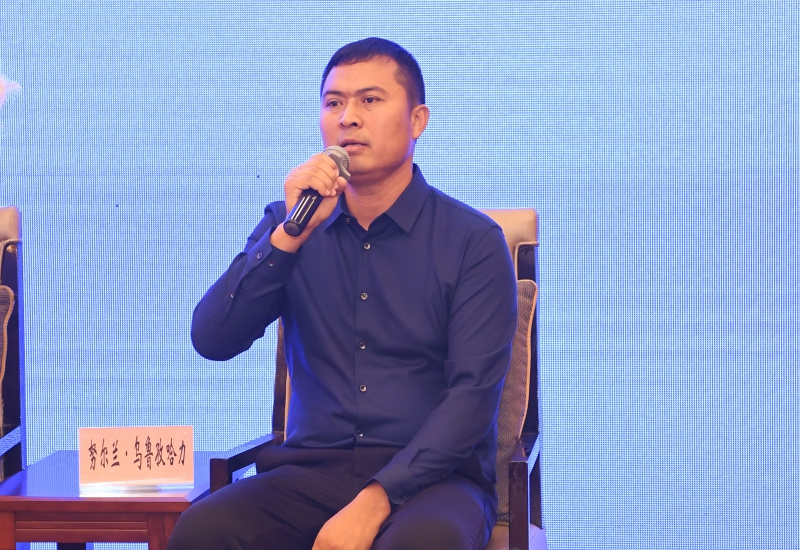
Photo taken on December 2, 2021 shows Nurlan Uruzhali speaks at the special press conference on Tacheng Prefecture by Xinjiang Uygur Autonomous Region. Photo by Xinjiang Daily/ Tang Yong
Nurlan Uruzhali: Hello, my name is Nurlan Uruzhali, Kazakh nationality. My hometown is Laozhuangzi Village, Huanggong Town, Wusu City, Tacheng Prefecture. I have been enaged in farming in the village for more than 20 years and have witnessed the development of cotton production in Xinjiang. Hereby I want to tell people all over the world the rapid development of cotton production in Xinjiang.
As a native farmer, I began to learn farming from my parents in 1998. My planting level has been continuously improved. In recent years, cotton planting has been managed by me. My parents retired and stayed at home. Over the past 20 years, I have witnessed the continuous development of cotton production in Xinjiang.
When I first started farming with my parents in 1998, my family planted more than 30 mu of land. From planting to harvest, the family was busy and tired from March to November. At that time, there was no planter for us and we needed to get help from others. The cotton field sown by old fashioned tractor was crooked, and the sowing amount per mu was seven or eight kilograms. Due to the heavy load of sowing, there are too many cotton seedlings. After the cotton seedlings came out, we had to manually pick up the seedlings, get interval space for the seedlings, fix the seedlings, seal the soil and apply pesticide. In the past, they used hand pressure sprayers, and only more than 20 acres farmland could be accomplished in a day. In the past, flood irrigation was applied in the cotton field. Due to the uneven ground, farmers had to keep digging channels in the cotton field and even turn on the flashlight to irrigate at night.
After 2010, the output and price of cotton were higher than before. The economic conditions at home were improved. My cotton planting level was also improved. I contracted 100 mu of land to grow cotton. Since then, the level of cotton production has also been improved to a great extent.
In recent years, with the continuous development of cotton planting mechanization in Xinjiang, cotton production in Xinjiang has entered a new stage. I feel that it is a good opportunity to grow 1,300 mu of cotton together with two friends, which are managed by three of us. My family doesn't need to participate at all. Now cotton planting is much simpler. There is a Beidou navigation precision unmanned planter, which can sow all seedlings and one seedling in one hole. There is no need for manual seedling spacing, seedling fixing and soil sealing. There are tillage scarifiers, large plant protection spraying machines, UAV flying defense and helicopter flying defense. 1300 mu of land can be completed in a few hours. Watering and fertilization are all water-saving drip irrigation, which can be completed by opening the valve. Cotton harvesting is now the most convenient. We have cotton picker manufacturers in Wusu. Many cotton pickers come to the door to help you pick cotton. Our 1300 mu land can be harvested in three days without manual picking.
There are four people in our family. Relying on hard work to grow cotton, our life is getting richer and richer. I have bought an apartment in the city, together with the latest household appliances and furniture. I just had a new car. Planting cotton has brought me a happy life.
Recently, anti-China forces in the United States and the West have fabricated the existence of "forced labor" in cotton planting in Xinjiang. I want to tell you loudly: This is sheer rumor, slander and nonsense! We all grow cotton on our own terms. Now cotton planting is basically mechanized from planting to harvest. For most of time workers are no longer necessary. How come we use "forced labor"! Is it wrong for us to use our hard work to create a better life? Please shut up!
Host: Thanks Nurlan Uruzhali for sharing with us. Xinjiang has been a multi-ethnic area since ancient times. It is an inalienable part of Chinese culture, featured with inclusiveness, mutual learning and integration of multiple cultures. In Xinjiang, all ethnic groups understand, respect, embrace, appreciate, learn from and help each other. They hold tight like pomegranate seeds, and the sense of community of the Chinese nation is deeply rooted in the hearts of the people. Next, let's invite Giaina Gerken, a herdsman of Ken A'Gen Village, Boltonggu Township, Shawan City, to talk about her life.
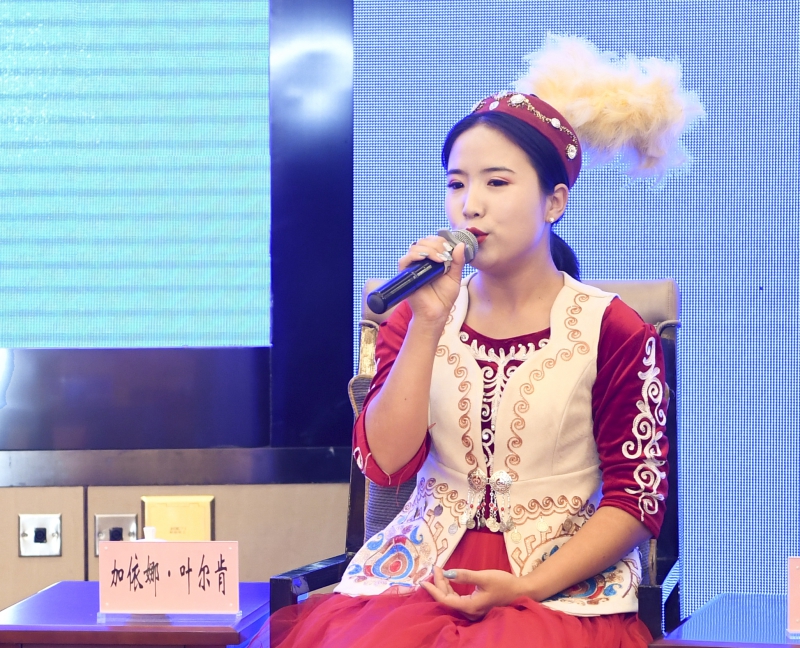
Photo taken on December 2, 2021 shows Giaina Gerken speaks at the special press conference on Tacheng Prefecture by Xinjiang Uygur Autonomous Region. Photo by Xinjiang Daily/ Tang Yong
Giaina Gerken: Hello, my name is Giaina Gerken, Kazakh nationality, 25 years old. I am a herdsman of Ken A'Gen Village, Boltonggu Township, Shawan City. My family has five members, my husband and I, two lively and lovely sons and my mother-in-law. Our family lives happily together.
My hometown Boltonggu Township, Shawan City has its unique advantage, with water from Tianshan and grasslands with lush plants, which is especially suitable for animal husbandry and tourism. I was born and raised in this beautiful place. I like every mountain and every inch of grassland here. Kazakh people take breeding as their main source of livelihood, mainly engaged in breeding cattle, sheep, horses, camels, etc. These animals are also my companions from my childhood to adulthood. When I was 7 years old, I was able to ride a horse. In summer, we rode horses on the grassland. In winter, we danced and sang in the warm yurt.
After getting married, my husband and I also raised horses, cattle and sheep. In summer, livestock grazed on the grassland and wintered in the warm pen, in winter. We sell not only mare's milk, milk, goat milk, as well as smoked horse meat, beef and mutton... In this way, we can earn income all year round.
As young herders, we know the importance of scientific breeding. Therefore, we often learn modern breeding technology through the guidance of animal husbandry technicians in the village, apart from online resources, and books to constantly improve the variety and quality of cattle and sheep, and increase our income every year.
At first, we only had dozens of sheep and cattle. Now, my family has more than 300 goats, more than 40 cattle and more than 20 horses. Our life is getting better and better!
"I love Tiananmen Square in Beijing, the sun rises from Tiananmen Square..." this song "I love Tiananmen Square in Beijing" is familiar to me when I was a child. Until now, I often sing it to my children.
In 2021, my husband and I had the idea of riding to Beijing to see the raise of the national flag on Tiananmen Square.
With the support of family and friends, we chose two strong horses among the herd and set off from Shawan City in Tacheng Prefecture all the way to the capital Beijing. On the way, we passed through lush farmland, vast Gobi, cloudless grassland... It took 74 days before we arrived in Beijing on July 27. On August 1, we witnessed the exciting moment when the national flag was raised on Tiananmen Square.
During this trip, we spent about 120,000 yuan, which we earned through hard work. For us, this trip to Beijing is the most unforgettable experience in our life. Along the way, we went through the vast land without a single household, endured the heat of 40 ℃, withstood the test of nature, and felt the warmth brought to us by the people of all ethnic groups. On the way, we had tasty milk tea sent by Kazakh friends, vegetables, food and medicine sent by Mongolian friends, and warm reception from Han friends...The most important thing is that we realized our dream and witnessed the solemn moment when the national flag was raised on Tiananmen Square. At that moment, I was proud of being Chinese; At that moment, we sang the National Anthem loudly.
After nine days in Beijing, we began to return to Xinjiang on August 4. When we returned, we came back by car. 99 days later, we returned to our hometown and were warmly welcomed and praised by our relatives, friends and villagers! The elders praised us for our courage! We also told the villagers and family what they saw and heard along the way and the great changes in the motherland! Everyone laments the great changes that have taken place in the motherland and the beautiful life now!
Yeah! I grew up in the mountains. Now my good life makes me feel proud of being Chinese. In my hometown, asphalt road leads to the door of my home, and water, electricity and network are also connected to every family. Farmers are no longer worried about medical bills. My two children have enjoyed free education since they went to kindergarten, as well as food subsidies and accommodation subsidies.
Those who spread rumors that Xinjiang restricts freedom of speech and freedom of movement, where do your fallacies come from? How much do you know about the development and changes in Xinjiang? Through our own hard work, we have continuously increased our income and living standards, and managed to live an increasingly better life. The people of all ethnic groups in Xinjiang will certainly create a far better life through their industrious hands.
Host: Thanks for Nurlan Uruzhali’s sharing.The Kazakh Aytis is a folk traditional art form of the Kazakh people, which is well-known. It is not only an artistic performance, but also a competition of wisdom and talent. It is the publicity and display of the courage, will, competitiveness and fighting power of grassland nomads.Hazza Tohay of Tuoli County hopes that more people will learn from Kazakh Aytes and inherit the national traditional culture. Next, let's invite Hazza Tohay of Tuoli County to tell her story.
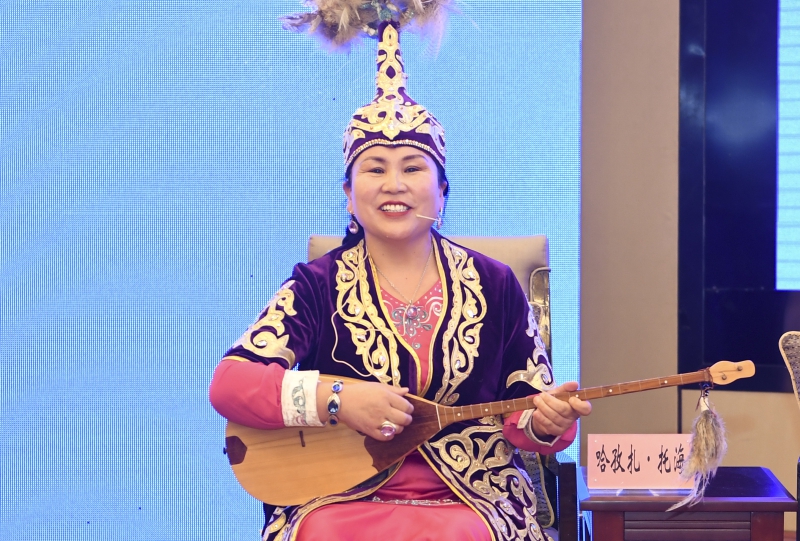
Photo taken on December 2, 2021 shows Hazza Tohay speaks at the special press conference on Tacheng Prefecture by Xinjiang Uygur Autonomous Region. Photo by Xinjiang Daily/ Tang Yong
Hazza Tohay: Hello everyone! My name is Hazza Tohay, a Kazakh , from Tuoli County. I am a member of the Federation of folk literature and art in Xinjiang Uygur Autonomous Region, Ili Kazakh Autonomous Prefecture, Tacheng Prefecture and Tuoli County.
Since I was a child, I have particularly loved Kazakh Aytis and folk literature and art. Since 1995, I have participated in nearly 100 international and domestic Kazakh Aytis competitions and won many awards and honors.
We Kazakhs respect Aken very much, because Aken praises people's happy life and guides people to unite, love and help each other. "Kazakh Aytis" is an impromptu performance without rote memorization. In the process of Aytis, Akens are sometimes funny and sometimes serious. Their wisdom and knowledge make the performance creative and challenging. It is a duel of wisdom to test Aken's wit and talent, so they are deeply adored by the mass.
Next, I'll put on an improvisational show right now. Hope you like it.
In China, the Kazakh Aytis have embarked on a broad road, and Aken's playing and singing art has been well protected and inherited.
Since I was 30 years old, I have trained more than 20 excellent young Aken. I'm glad that some of these Akens I trained have participated in the Aken Aytis competition at the autonomous region level and obtained excellent results. For this reason, I am very proud.
In 2006, the Kazakh Aytis was included in the national intangible cultural heritage list. In order to continue to carry forward the Kazakh Aytis, many places in Xinjiang would hold relevant competitions every year. Kuitun Institute of Education and other colleges and universities have also set up Kazakh Aytis art classes. I am often invited to give lectures in the school. Therefore, I have never worried about the loss of Kazakh Aytis. I have gained their recognition. As a inheritor, I will cultivate more excellent inheritors and carry forward our Kazakh Aytis culture.
Recently, the anti-China forces in the United States and the West have fabricated "cultural extinction" in Xinjiang, which is nonsense. In the process of studying Aken art, I have had exchanges with many folk artists, and everyone has received the support and help of the state. In the future, I will devote my whole life to our literary and artistic career, to the Kazakh Aytis culture, and guide more disciples to carry it forward.
Host: Thanks for Hazza Tohay’s telling and performance. Xinjiang attaches great importance to education work and gives priority to education development. Education at all levels and of all types have achieved higher popularization and higher quality development. The overall level of education is at the historical best and fastest development stage. Ayguli Mayer is a kindergarten teacher who enjoys a happy life with her children every day. Then, let’s give the floor to Ayguli Mayer, a teacher from Yumin County No.1 kindergarten to talk about her life.

Photo taken on December 2, 2021 shows Ayguli Mayer speaks at the special press conference on Tacheng Prefecture by Xinjiang Uygur Autonomous Region. Photo by Xinjiang Daily/ Tang Yong
Ayguli Mayer: Hello everyone! My name is Ayguli Mayer, a Uygur, who is a teacher of the No.1 Kindergarten in Yumin County. There are four people in the family, my husband, two sons and me. The eldest son is studying in the Yumin County No.2 Primary School, and the youngest son is in middle class in the Yumin County No.1 Kindergarten.
My grandparents are ordinary, illiterate farmers, so my grandfather particularly hoped that my father could receive better education. On my father's birthday in his childhood, he got the most precious gift in his lifetime——a Xinhua Dictionary from his father. Through unremitting efforts, my father took the college entrance examination and was admitted to a university, which changed his life. My father learned from the practice of self-learning the importance of grasping knowledge, so he particularly stressed the education of his children. Because of his words and deeds, now all my siblings and I have become useful members of the society.
Kindergarten is an important part of my life. When I was sensible, my family moved nearby the kindergarten and I often saw carefree children playing there. When I was playing with other children in my childhood, I liked playing the role of a teacher, and my dream was to be a preschool teacher. With the help of the national education policy, I was admitted to my dream college and became a preschool teacher after graduation.
In recent years, the country attaches more and more attention to preschool education, apart from increasing the number of teachers, the government increased investment in improving teaching environment by building spacious and bright classrooms, bringing in teaching equipment, expanding room for children activities. Meanwhile, in the classroom, "construction area", "book corner", "art experience " and "life experience" and other areas were developed to facilitate the open-mindedness and ingenuity of children of all ethnic groups. With the popularity of preferential education policies, children's insurance and education fees, teaching materials fees have been reduced or waived. What’s more, subsidies have been offered to children's "meals and dessert"
I am engaged in the education. I see that children of all ethnic groups in Xinjiang enjoy the same educational resources, and parents can rest assured to send their children to school for education. It is worth mentioning that in Yumin County a considerable number of students are from pastoral areas, in order to solve the worries of herdsmen parents, the state invested a great deal and set up boarding schools in the county and towns. It not only solved the problem of herdsmen children who live far from school, but also provided accommodation services for farmers, herdsmen and migrant families. Children live and study at school from Monday to Friday, return their homes on Saturday and Sunday. The country also provides living subsidies, which reduces the financial pressure of many families while providing a good living environment for students at school.
Recently, I learned on the Internet that the anti-China forces in the U.S. and West spread the rumor that the language of our minority became extinct and our children were "intergenerationally isolated". It is simply nonsense! In terms of the education of the children of my relatives and friends, those who have learned many languages have a relatively wide employment channel when they grow up. Some have found jobs beyond Xinjiang, and some even go to work abroad. All the children I know, regardless of any nationality, are enjoying superior educational resources. They rely on their own efforts to create their own better life.
Host: Thank you Ayguli Mayer for your sharing.
Xinjiang attaches great importance to the excavation, inheritance and protection of excellent traditional cultures of all ethnic groups, adhering to the creative transformation and innovative development, promoting the development of cultural undertakings and cultural industries, and promoting the cultural modernization of all ethnic groups. Then, let’s give the floor to Dorji Nima, the Deputy Dirctor of Jiang'ger Art Troupe of Hoboksar Mongolian Autonomous County to tell us the story about "Jiang'ger" and him.
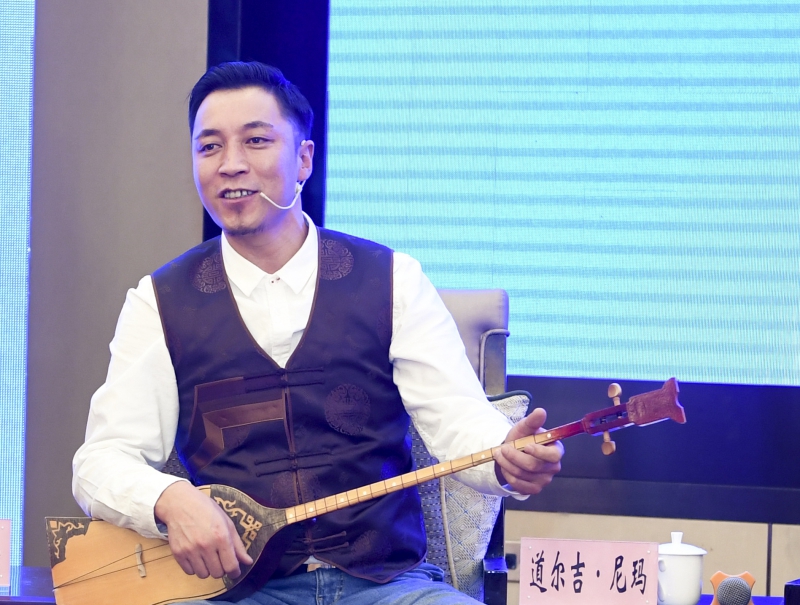
Photo taken on December 2, 2021 shows Ayguli Mayer speaks at the special press conference on Tacheng Prefecture by Xinjiang Uygur Autonomous Region. Photo by Xinjiang Daily/ Tang Yong
Dorji Nima: Hello, everyone! My name is Dorji Nima, a Mongolian, from Hoboksar Mongolian Autonomous County, Tacheng. I am the autonomous regional inheritor of the representative national intangible cultural heritage project. Today, I am very happy to tell you the story of me and "Jiang'ger".
The heroic epic "Jiang'ger" is one of China's excellent cultural heritages and one of the national intangible cultural heritages.The "Jiang'ger" epic is named after the hero Jiang'ger, being passed down by chanting.The epic "Jiang'ger" mainly tells the story of Jiang'ger leading twelve warriors to overcome the demons invading their hometown, finally established a harmonious and prosperous Baumba Paradise without war, hunger and aging but honesty. People living there are granted with eternal youth and great strength.
My hometown is Hoboksar Mongolian Autonomous County, the birthplace of the epic of "Jiang'ger". So it has won the reputation of "hometown of Jiang'ger ". Here, from 7-year-old children to 70-year-old senior citizen, they are fans of Jiang'ger Qi, an oral bard.
My grandfather Jia Zhunai was born in the Jiang'ger Qi family. He is the third generation of Jiang'ge Qi inheritor. As the national inheritor of Jiang'ger culture, he is also the venerable Jiang'ger Qi. My grandpa can memorize every single word of the epic "Jiang'ger" and put it down. His chanting of "Jiang'ger" was recorded in two forms: oral chanting and transcript. "Jiang'ger" consists of 45 chapters and 240,000 lines. A great number of disciples have been trained by my grandfather. His chanting is loud, clear and rhythmic. All parts of his chanting remains complete, concise in language with poetic beauty. He has been highly thought of by researchers home and abroad. He has been loved and admired because of this.
I have been living with grandpa since childhood. My major fun is to listen to my grandpa’s chanting of "Jiang'ger". I like to listen to "Jiang'ger", so at the age of seven, I began to learn to chant "Jiang'ger" from my grandpa, at the age of thirteen, I can independently chant a whole chapter of the epic. Even when I go to school, I never quit learning it. I have mastered ten chapters so far. In order to protect and inherit the Jiang'ger culture better, I opened a Jiang'ger chanting class in my hometown, and trained more than 100 little Jiang'ger Qi in recent years.
Hoboksar County attaches great importance to the inheritance and protection of Jiang'ger culture. It has been actively building the Jiang'ger cultural brand and carrying out all kinds of Jiang'ger cultural activities.So far, 17 Jiang'ger Cultural Tourism Festival and Nadam Fair have been held.If our culture goes extinct, how can this happen?
As an inheritor of Jiang'ger, I have the responsibility and obligation to take good care of the inheritance and protection of national art. Jiang'ger inheritance is my life and blood. I will use my life to inherit and carry forward Jiang'ger culture. I have determined to play and chant Jiang'ger through my life.
Now I will play and chant for you a paragraph of Jiang'ger(Jiang’ger paean ).
Recently, I learned on the Internet that anti-China forces in the US and the Western spread rumors that there is a "cultural extinction" in Xinjiang, which is simply nonsense.As a native of Xinjiang, as an inheritor of Jiang'ger culture. I have the best say regarding to this!I would say that our Jiang'ger culture is being carefully protected and it is growing. The fact is the truth.
Host: Thank you Dorji Nima for your sharing and wonderful performance.Just now, Aydin Toluhan, the Commissioner of Tacheng Prefecture Administration, introduced the economic and social development and the improvement of people's livelihood, and 10 grassroots cadres shared their happy life with the masses, showing us a harmonious, open, confident and happy Tacheng. The development and changes in Tacheng Prefecture and the happy life of the people of all ethnic groups are an epitome of the high-quality development and the improvement of the lives of all ethnic groups in Xinjiang.We welcome you to come to Xinjiang to have a look, experience the tremendous changes in Xinjiang, feel the multicultural of Xinjiang, and witness the happy life of the people of Xinjiang Uygur Autonomous Region.
This is the end of today's press conference. Thank you! Speakers and friends from the media!








